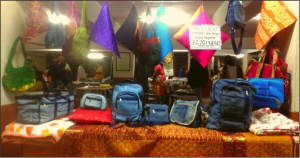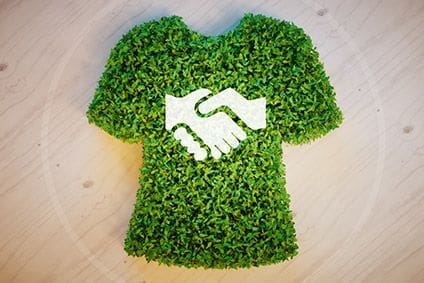Upcycling represents a variety of processes by which “old” products get to be modified and get a second life as they’re turned into a “new” product. So, by mixing and aggregating used materials, components and items, the end product holds more value than the original whilst increasing its longevity, therefore leading to reduction in waste and pollution. Upcycling is about re-adapting or re-purposing materials or items in a creative way with the intention of expanding the life span of a product.
To manufacture or make a new product, it takes a lot of time, energy for extraction, new raw materials, chemicals, water etc. The case with upcycling is however very different from the former as there are no new substances, chemicals or a huge amount of water that is involved. Instead, this process of re creating a product into something new and more useful leads to reduction in carbon emissions.
Upcycling stops adding stuff to a world that is already overwhelmed with material things. It also reuses materials that may otherwise end up in the landfill in creative and innovative ways- producing original often one of a kind items from what many consider to be waste. It is a way for companies and designers to be more efficient with leftover materials such as upholstery scraps or vintage textiles and to give new life to worn out jeans and tattered T-shirts.
Personal benefits of Upcycling
- Doing your bit for Mother Nature
Nothing beats that warm and fuzzy feeling you get inside when you’ve done something great for the planet. Also, there’s a sense of love when you make something with your own hands bcs you value the time and efforts that you’ve put into it. - Crafty repair skills
Repairing an item and giving it a new life is a great skill and a wonderful feeling. Also, you don’t have to throw your most loved possessions. Just a little bit of creativity and efforts will give you a new product. - One-of-a-kind items
Whether you’re upcycling things yourself or buying products from designers, it’s always nice to know that you have something that is completely unique. It makes you a more environmentally conscious person too.
SAKHI PAWAR AND MADHURI JOSHI, SAKHI, PUNE

Rajashree, spent a number of years working as a house help in Pune to provide meals for her family. It all changed for her when a doctor who examined the condition of her blistered hands and asked her to completely stop working as a maid.
That is when her former employer, Sanjeevani Pawar intervened.
Rajashree is associated with Sakhi, a Self-Help Group in Pune started by Sanjeevani Pawar and her friend Madhuri Joshi in 2015. Rajashree worked as a house help at Pawar’s house. “Our initial plan was to only help Rajashree but as people started appreciating the products she stitched, we expanded the movement and roped in 2-3 other women from poverty-stricken households. We helped them till they found customers,” Pawar, a biology professor, told a portal.
Rajashree had spent a number of years as a house help, but now, she runs a business wherein she upcycles old, torn, and rejected clothes and converts them into utilitarian items like bags, quilts, purses, doormats and folders. At the moment, her monthly income is around Rs 5,000. Rajashree, does not forget to count her blessings at each turn of a new day. She has more time to spend with her family and take care of herself. Her hands, which used to be blistered or raw from scrubbing floors and utensils, are now always busy creating something beautiful. Rajashree is one of the 16 women whose lives have changed through ‘Sakhi’.
Pawar’s initiative is also helping women who are nearing retirement age and find it difficult to look for a job owing to illiteracy. “It is a struggle for old domestic workers to carry out physical work or find another job because of illiteracy. Keeping that in mind, we provided training so that in future if they want to stitch they can do so. In Sakhi, some have taken up stitching on a full-time basis and others as part-time,” she added.
Customers can send in items that they no longer use and can receive brand new utility items. All of this when they are only paying sewing charges. Customers from across the city donate waste clothes to these women and in return get brand new items made from them. The best part for customers is that they only have to pay for sewing charges.
So far, these women have made over 10,000 godhdis (quilts) and innumerable products, “Honestly, we have lost the count of the number of clothes we have upcycled,” quips Pawar.
Reviving Old Traditions

Like every other Indian household, Pawar’s family also followed the practice of reusing household items until they exhausted its utility limit. In fact, Pawar’s mother was quite popular in her social circle for stitching godhdis from her old sarees and other clothes.
Pawar couldn’t imagine that her old school methods would one day not only be an extra source of income for women but also benfit the environment. She believes that we live in a fast paced world where people discard their clothes very frequently, either bcs they get bored of it or it goes out of fashion. Fast consumerism has led to constant deterioration of our mother Earth and the sustainable practice of upcycling could help to mitigate it.
Pawar trains women in basic stitching, knitting and designing the products to make them look more attractive. Pawar’s initiative is also helping women who are nearing their retirement age. At Sakhi, they believe that it is a struggle for old domestic workers to carry out physical work or find another job because of illiteracy. Keeping that in mind, Pawar provided training so hat in future if the women want to stitch, they can. Some women have taken up stitching on a full time basis and others as part time.
Joshi and Pawar are also educating women about financial management so that their hard-earned money is judiciously used.
Initiatives such as these could be replicated among poorer communities, especially those where literacy rate is very low. Education being criteria in the majority of the jobs, such upskilling initiatives scan financially uplift women.
By Vasavi Mehta
References
https://www.triplepundit.com/story/2014/upcycling-new-wave-sustainable-fashion/58691
https://youmatter.world/en/definition/upcycling/
https://icosiest.com/blogs/outdoor/creative-ideas-outdoor-patio-yard-design

